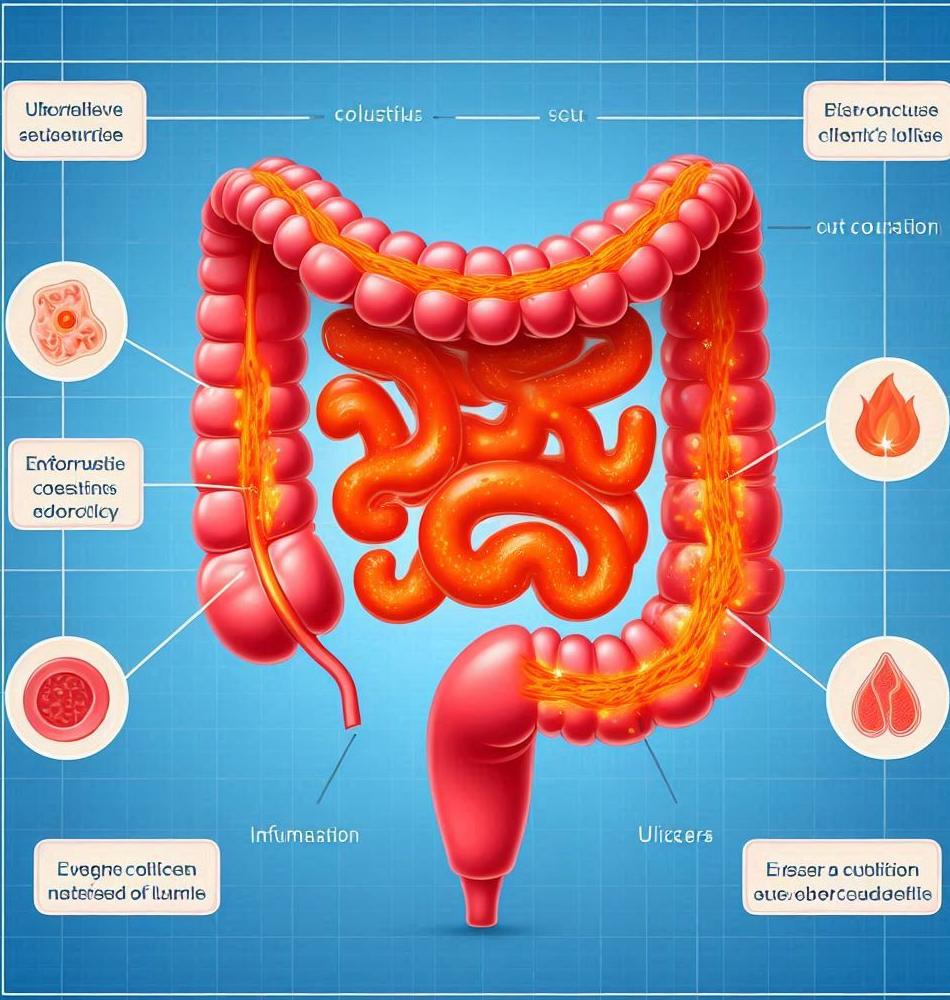Ulcerative colitis is a chronic inflammatory bowel disease that can significantly impact a person's quality of life. Discover the severity, symptoms, and treatments of this condition in our comprehensive guide.
Introduction
Ulcerative colitis is more than just a mouthful of a name. It is a serious chronic condition that affects countless individuals around the globe. For many, it can lead to a cycle of intense symptoms, emotional distress, and lifestyle disruptions. Understanding the seriousness of this illness is key to recognizing its impact and navigating treatment options. Whether you are someone living with ulcerative colitis, a caregiver, or just curious, this article offers insights into the condition's gravity and implications.
What is Ulcerative Colitis? 🧬
Ulcerative colitis is a form of inflammatory bowel disease, or IBD, that specifically targets the large intestine, also known as the colon. It results in inflammation, ulceration, and various other complications. The severity of ulcerative colitis can vary widely among individuals.
Understanding Inflammation and Ulcers
The autoimmune nature of ulcerative colitis means that the body's immune system mistakenly attacks its own intestinal lining, leading to:- Inflammation of the colon- Formation of ulcers, which can bleed- Frequent bowel movements
Symptoms of Ulcerative Colitis
The symptoms can range from mild to severe, significantly affecting daily life:1. Abdominal pain and cramping2. Diarrhea, which can be bloody3. Urgency to have bowel movements4. Fatigue5. Fever6. Weight loss
Complications That May Arise
While many individuals manage their symptoms well, ulcerative colitis may lead to severe complications, such as:- Dehydration due to persistent diarrhea - Severe bleeding- Perforated colon- Increased risk of colon cancer
How Serious is Ulcerative Colitis? 🩻
The seriousness of ulcerative colitis can be understood through its impact on various aspects of life, both physical and emotional.
Physical Impact
Living with ulcerative colitis means dealing with ongoing symptoms that can vary in intensity. Many may find themselves caught in a cycle of flare-ups and periods of remission, which can be exhausting and challenging. Regular doctor visits and lab tests can feel like a second job.
Quality of Life Considerations
- Physical Limitations: Some individuals may face limitations in physical activities, whether it's a casual walk or intense workouts, due to painful flare-ups.- Nutritional Adjustments: Managing diet becomes crucial, as certain foods may exacerbate symptoms and lead to further complications. - Sleep Disturbances: Frequent trips to the bathroom can disrupt sleep and lead to chronic fatigue.
Emotional and Psychological Toll
The mental health implications of ulcerative colitis can be profound. Those affected may deal with:- Anxiety over sudden flare-ups or bowel urgency- Social isolation due to embarrassment in public settings- Overall emotional distress from living with a chronic condition
Diagnosis of Ulcerative Colitis 🔬
Diagnosis is usually made through a combination of patient history, physical examination, and various medical tests. These may include:- Colonoscopy: This is the primary method for diagnosis, allowing doctors to observe the inner lining of the colon and obtain tissue samples.- Blood tests: These can help identify inflammation, anemia, or signs of infection.- Imaging studies: X-rays and CT scans may be used to assess any complications arising from the condition.
Diagnostic Procedures Breakdown
- **Colonoscopy:** A key procedure that aids in direct observation and biopsy.- **Blood Tests:** Essential for understanding the severity of inflammation and overall health status.- **CT Scans:** Helpful for identifying complications or assessing the extent of the disease.
Living with Ulcerative Colitis: Treatment and Management 💊
Managing ulcerative colitis takes a tailored approach that may include medication, dietary adjustments, and sometimes surgery.
Medications Used
The treatment plan is often multifaceted, and some common medication types include:- Aminosalicylates: These reduce inflammation in the lining of the intestines.- Corticosteroids: Effective during flare-ups, these can help reduce inflammation quickly.- Immunosuppressants: These medications are aimed at suppressing the immune system to prevent it from attacking the colon tissue.
Diet and Lifestyle Adjustments
The dietary requirements can be highly individual; however, some common recommendations include:- Keeping a food diary to identify trigger foods- Eating smaller, more frequent meals- Staying hydrated, particularly during flare-ups
Support Groups and Resources
For those living with ulcerative colitis, connecting with others facing similar challenges can provide emotional support and practical advice. Various organizations offer resources and community connections.
FAQs About Ulcerative Colitis 🤔
- What causes ulcerative colitis?- Is ulcerative colitis hereditary?- Can stress worsen ulcerative colitis symptoms?- What foods should I avoid if I have ulcerative colitis?- How is ulcerative colitis different from Crohn's disease?
Conclusion 🌟
Ulcerative colitis presents serious challenges, but with the right management strategies, individuals can lead fulfilling lives. It is vital for those affected to stay informed, seek medical advice, and maintain open communication with healthcare providers. Awareness promotes understanding and creates a supportive environment for those facing the serious realities of ulcerative colitis.


